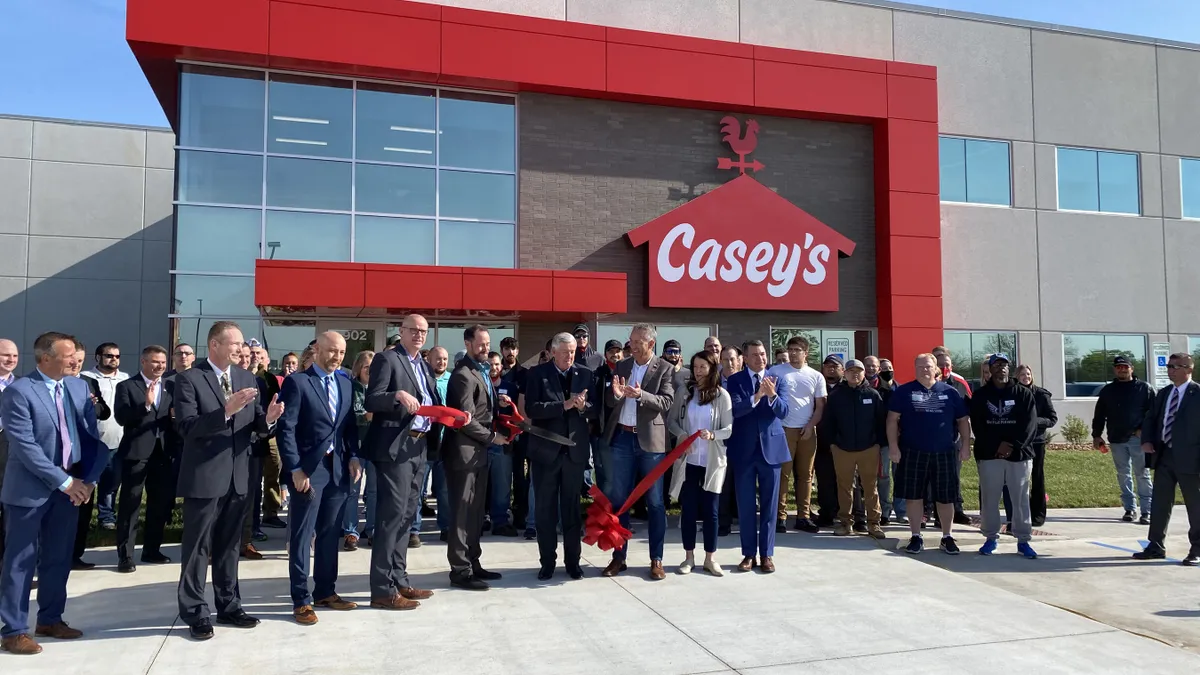When Urban Outfitters’ parent company announced plans for a new fulfillment center in Missouri last month, Gov. Mike Parson highlighted the advantage geography plays in the state's pursuit of new business developments.
"Missouri is a strategic choice for companies like [URBN brand] Nuuly that are searching for a location in the middle of America for their expansion projects,” Parson said in a statement.
In recent years, the state has become a prevalent link in more companies' supply chains due to its central location, mix of incentives and healthy labor supply. And even though warehouse rents have reached unseen heights in recent years, that’s unlikely to spook off businesses any time soon.
This is particularly the case in the Kansas City market, which saw a record-high industrial real estate net absorption in 2022 despite unprecedented rent growth, according to JLL.
"Lease agreements saw increases in final agreed upon terms not seen in decades, especially in new construction," according to a Q4 report from the commercial real estate firm.
Notable warehouse announcements in Missouri since 2020
| Company | City | Facility type |
|---|---|---|
| Chewy | Belton | E-commerce fulfillment center |
| Frozen Food Express Transportation Services | Butler | Transportation and logistics facility |
| Melaleuca | Kansas City | Distribution center |
| Kenco Logistics | Liberty | Warehouse and distribution operation |
| Hallmark | Liberty | Distribution center (expansion) |
| Walgreens | Liberty | Micro-fulfillment center |
| URBN | Raymore | Fulfillment center for Nuuly brand |
| Optimas Solutions | Overland | PPE distribution center |
| Chick-fil-A | Maryland Heights | Distribution center |
| Casey’s General Stores | Joplin | Distribution center |
Note: The first eight facilities listed are all in the Kansas City metropolitan area.
The pressure of elevated transportation costs since the COVID-19 pandemic can make pricier lease agreements more palatable for companies.
Occupancy costs account for just 3% to 6% of total logistics spend, per a CBRE report published in November, while transportation costs make up 50% to 70%. Beyond cost, long transit times from distant facilities are a tough sell to consumers often seeking Amazon Prime-like delivery speeds, no matter the company they’re ordering from.
"Reducing the order cycle time, which is derived from lower transit time, is critical," said Gawon Yun, assistant professor of logistics and supply chain management at Missouri State University.
Eighty-five percent of the U.S. population can be reached from a Kansas City location in two days or less, according to the Missouri Department of Economic Development. This has resulted in increased interest for Kansas City-area real estate from companies with e-commerce fulfillment operations, including Chewy, which opened its 800,000-square-foot Belton, Missouri, fulfillment center in 2021.
Missouri attracted the online pet products retailer due to its strong labor market and geographic advantages, Pete Krillies, VP of real estate, facilities and procurement, said in an emailed statement.
"Specifically, the city of Belton provided a prime location that could accommodate the size of our business," Krillies said. "This has allowed us to grow our Belton team to more than 1,100 team members and continue to serve our customers within our 1-2 day delivery promise."
Chewy announced its plans in Belton in the summer of 2020, a period of immense economic uncertainty as the COVID-19 pandemic was still in its early stages. Subash Alias, CEO of Missouri Partnership, said it was a surprise when a firm representing Chewy inquired about the Kansas City area.
"We were so thrilled to get a call, but that was the first of so many," Alias said.
Demand for fulfillment and distribution centers supporting e-commerce operations accelerated further in the years after Chewy's announcement, Alias said, and URBN's planned opening adds to that trend.
Industrial tenants flocked to Kansas City last year
But sustaining the momentum in Missouri could be tough: The local real estate market is tightening as the national market is seeing a slowdown amid a wave of economic uncertainty.
The Kansas City market's industrial construction pipeline decreased in Q4 as completions outpaced groundbreakings, according to JLL. The firm attributed that in part to project delays as companies face higher interest rates, but it noted there's still room for growth.
"The pace of new construction going into 2023 remains strong, outpacing the levels seen at any point before 2022 and is anticipated to meet market demand," per JLL.













